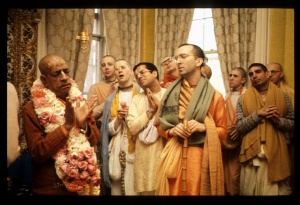CC Antya 17.31: Difference between revisions
m (1 revision(s)) |
(Vanibot #0054 edit - transform synonyms into clickable links, which search similar occurrences) |
||
| (One intermediate revision by one other user not shown) | |||
| Line 1: | Line 1: | ||
{{ | [[Category:Sri Caitanya-caritamrta - Antya-lila Chapter 17|C031]] | ||
<div style="float:left">'''[[Sri Caitanya-caritamrta|Śrī Caitanya-caritāmṛta]] - [[CC Antya|Antya-līlā]] - [[CC Antya 17|Chapter 17: The Bodily Transformations of Lord Śrī Caitanya Mahāprabhu]]'''</div> | |||
<div style="float:right">[[File:Go-previous.png|link=CC Antya 17.30|Antya-līlā 17.30]] '''[[CC Antya 17.30|Antya-līlā 17.30]] - [[CC Antya 17.32|Antya-līlā 17.32]]''' [[File:Go-next.png|link=CC Antya 17.32|Antya-līlā 17.32]]</div> | |||
{{CompareVersions|CC|Antya 17.31|CC 1975|CC 1996}} | |||
{{RandomImage}} | |||
==== TEXT 31 ==== | ==== TEXT 31 ==== | ||
<div | <div class="verse"> | ||
kā stry aṅga te kala-padāmṛta-veṇu-gīta- | :kā stry aṅga te kala-padāmṛta-veṇu-gīta- | ||
sammohitārya-caritān na calet tri-lokyām | :sammohitārya-caritān na calet tri-lokyām | ||
trailokya-saubhagam idaṁ ca nirīkṣya rūpaṁ | :trailokya-saubhagam idaṁ ca nirīkṣya rūpaṁ | ||
yad go-dvija-druma-mṛgāḥ pulakāny abibhran | :yad go-dvija-druma-mṛgāḥ pulakāny abibhran | ||
</div> | </div> | ||
| Line 14: | Line 18: | ||
==== SYNONYMS ==== | ==== SYNONYMS ==== | ||
<div | <div class="synonyms"> | ||
''[//vanipedia.org/wiki/Special:VaniSearch?s=kā&tab=syno_o&ds=1 kā]'' — what; ''[//vanipedia.org/wiki/Special:VaniSearch?s=strī&tab=syno_o&ds=1 strī]'' — woman; ''[//vanipedia.org/wiki/Special:VaniSearch?s=aṅga&tab=syno_o&ds=1 aṅga]'' — O Kṛṣṇa; ''[//vanipedia.org/wiki/Special:VaniSearch?s=te&tab=syno_o&ds=1 te]'' — of You; ''[//vanipedia.org/wiki/Special:VaniSearch?s=kala&tab=syno_o&ds=1 kala]-[//vanipedia.org/wiki/Special:VaniSearch?s=pada&tab=syno_o&ds=1 pada]'' — by the rhythms; ''[//vanipedia.org/wiki/Special:VaniSearch?s=amṛta&tab=syno_o&ds=1 amṛta]-[//vanipedia.org/wiki/Special:VaniSearch?s=veṇu&tab=syno_o&ds=1 veṇu]-[//vanipedia.org/wiki/Special:VaniSearch?s=gīta&tab=syno_o&ds=1 gīta]'' — of the sweet songs of the flute; ''[//vanipedia.org/wiki/Special:VaniSearch?s=sammohitā&tab=syno_o&ds=1 sammohitā]'' — being captivated; ''[//vanipedia.org/wiki/Special:VaniSearch?s=ārya&tab=syno_o&ds=1 ārya]-[//vanipedia.org/wiki/Special:VaniSearch?s=caritāt&tab=syno_o&ds=1 caritāt]'' — from the path of chastity according to Vedic civilization; ''[//vanipedia.org/wiki/Special:VaniSearch?s=na&tab=syno_o&ds=1 na]'' — not; ''[//vanipedia.org/wiki/Special:VaniSearch?s=calet&tab=syno_o&ds=1 calet]'' — would wander; ''[//vanipedia.org/wiki/Special:VaniSearch?s=tri&tab=syno_o&ds=1 tri]-[//vanipedia.org/wiki/Special:VaniSearch?s=lokyām&tab=syno_o&ds=1 lokyām]'' — in the three worlds; ''[//vanipedia.org/wiki/Special:VaniSearch?s=trai&tab=syno_o&ds=1 trai]-[//vanipedia.org/wiki/Special:VaniSearch?s=lokya&tab=syno_o&ds=1 lokya]-[//vanipedia.org/wiki/Special:VaniSearch?s=saubhagam&tab=syno_o&ds=1 saubhagam]'' — which is the fortune of the three worlds; ''[//vanipedia.org/wiki/Special:VaniSearch?s=idam&tab=syno_o&ds=1 idam]'' — this; ''[//vanipedia.org/wiki/Special:VaniSearch?s=ca&tab=syno_o&ds=1 ca]'' — and; ''[//vanipedia.org/wiki/Special:VaniSearch?s=nirīkṣya&tab=syno_o&ds=1 nirīkṣya]'' — by observing; ''[//vanipedia.org/wiki/Special:VaniSearch?s=rūpam&tab=syno_o&ds=1 rūpam]'' — beauty; ''[//vanipedia.org/wiki/Special:VaniSearch?s=yat&tab=syno_o&ds=1 yat]'' — which; ''[//vanipedia.org/wiki/Special:VaniSearch?s=go&tab=syno_o&ds=1 go]'' — the cows; ''[//vanipedia.org/wiki/Special:VaniSearch?s=dvija&tab=syno_o&ds=1 dvija]'' — birds; ''[//vanipedia.org/wiki/Special:VaniSearch?s=druma&tab=syno_o&ds=1 druma]'' — trees; ''[//vanipedia.org/wiki/Special:VaniSearch?s=mṛgāḥ&tab=syno_o&ds=1 mṛgāḥ]'' — forest animals like the deer; ''[//vanipedia.org/wiki/Special:VaniSearch?s=pulakāni&tab=syno_o&ds=1 pulakāni]'' — transcendental jubilation; ''[//vanipedia.org/wiki/Special:VaniSearch?s=abibhran&tab=syno_o&ds=1 abibhran]'' — manifested. | |||
</div> | </div> | ||
| Line 21: | Line 25: | ||
==== TRANSLATION ==== | ==== TRANSLATION ==== | ||
<div | <div class="translation"> | ||
"[The gopīs said:] 'My dear Lord Kṛṣṇa, where is that woman within the three worlds who would not be captivated by the rhythms of the sweet songs coming from Your wonderful flute? Who would not fall down from the path of chastity in this way? Your beauty is the most sublime within the three worlds. Upon seeing Your beauty, even cows, birds, animals and trees in the forest are stunned in jubilation.’ | |||
</div> | </div> | ||
| Line 28: | Line 32: | ||
==== PURPORT ==== | ==== PURPORT ==== | ||
<div | <div class="purport"> | ||
This verse is from Śrīmad-Bhāgavatam ([[SB 10.29.40]]). | This verse is from ''Śrīmad-Bhāgavatam'' ([[SB 10.29.40]]). | ||
</div> | </div> | ||
__NOTOC__ | |||
<div style="float:right; clear:both;">[[File:Go-previous.png|link=CC Antya 17.30|Antya-līlā 17.30]] '''[[CC Antya 17.30|Antya-līlā 17.30]] - [[CC Antya 17.32|Antya-līlā 17.32]]''' [[File:Go-next.png|link=CC Antya 17.32|Antya-līlā 17.32]]</div> | |||
__NOTOC__ | |||
__NOEDITSECTION__ | |||
Latest revision as of 20:02, 19 February 2024

A.C. Bhaktivedanta Swami Prabhupada
TEXT 31
- kā stry aṅga te kala-padāmṛta-veṇu-gīta-
- sammohitārya-caritān na calet tri-lokyām
- trailokya-saubhagam idaṁ ca nirīkṣya rūpaṁ
- yad go-dvija-druma-mṛgāḥ pulakāny abibhran
SYNONYMS
kā — what; strī — woman; aṅga — O Kṛṣṇa; te — of You; kala-pada — by the rhythms; amṛta-veṇu-gīta — of the sweet songs of the flute; sammohitā — being captivated; ārya-caritāt — from the path of chastity according to Vedic civilization; na — not; calet — would wander; tri-lokyām — in the three worlds; trai-lokya-saubhagam — which is the fortune of the three worlds; idam — this; ca — and; nirīkṣya — by observing; rūpam — beauty; yat — which; go — the cows; dvija — birds; druma — trees; mṛgāḥ — forest animals like the deer; pulakāni — transcendental jubilation; abibhran — manifested.
TRANSLATION
"[The gopīs said:] 'My dear Lord Kṛṣṇa, where is that woman within the three worlds who would not be captivated by the rhythms of the sweet songs coming from Your wonderful flute? Who would not fall down from the path of chastity in this way? Your beauty is the most sublime within the three worlds. Upon seeing Your beauty, even cows, birds, animals and trees in the forest are stunned in jubilation.’
PURPORT
This verse is from Śrīmad-Bhāgavatam (SB 10.29.40).